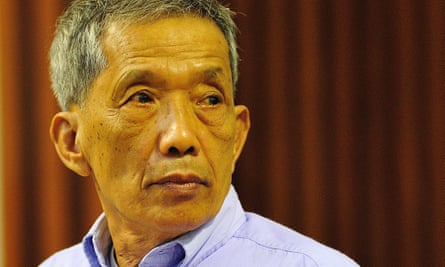Khmer Circle:
Sihanouk said he feared for his life and that of his family too - including Monique and current king Sihanomi who is following in his late father's footsteps in "giving to Caesar what is Caecar's"! - despite having done all he could to aid the Khmer Rouge's rise to power when he was still at liberty to freely enact his free will. Many other Cambodians are still doing the same under Hun Sen out of cowardice and self-preservation...
🔺🔺🔺

Cambodian Khmer Rouge leader ‘Comrade Duch’ was serving a life sentence when he died. Photograph: Eccc Handout/EPA
Rebecca Ratcliffe and agencies

Cambodian Khmer Rouge leader ‘Comrade Duch’ was serving a life sentence when he died. Photograph: Eccc Handout/EPA
Rebecca Ratcliffe and agencies
Wed 2 Sep 2020 08.43 BST
G
The chief jailer of Cambodia’s Khmer Rouge regime, known as Comrade Duch, who oversaw the mass murder of at least 14,000 Cambodians at the notorious Tuol Sleng prison, has died.
G
The chief jailer of Cambodia’s Khmer Rouge regime, known as Comrade Duch, who oversaw the mass murder of at least 14,000 Cambodians at the notorious Tuol Sleng prison, has died.
Duch, who was 77 and in poor health, died at a hospital in Phnom Penh in the early hours of Wednesday.
In 2010, the commander was the first Khmer Rouge figure to be held accountable by a court for atrocities committed under the ultra-communist regime, which killed an estimated 1.7 million people, a quarter of Cambodia’s population, between 1975 and 1979.
His death was “a reminder that justice is a long and difficult” process, said Youk Chhang, the director of the Documentation Center of Cambodia, which conducts research on the Khmer Rouge regime. “Perhaps it can bring some satisfaction to the living, and the fallen can now rest in peace.”
As head of Tuol Sleng, Duch presided over the torture and executions of thousands of men, women and children. Prisoners were forced to give detailed confessions outlining their supposed disloyalty, and implicating friends and family. They were then driven to the killing fields of Choeung Ek, where they were bludgeoned to death. Victims were sometimes forced to dig their own graves.
Duch was convicted of crimes against humanity in 2010, and was later sentenced to life after a UN-backed tribunal rejected his appeal that he was a junior official following orders.
Duch, whose given name was Kaing Guek Eav, had by the time of his trial expressed regret for his crimes, though his contrition has been questioned. In 2009, he told the court: “I am solely and individually responsible for the loss of at least 12,380 lives.” Days later, however, he asked to be acquitted and released, enraging victims’ families.
He argued that he had been following orders, fearing for his life and for his family.
The prison, which was based in a former secondary school in the centre of Phnom Penh, became a symbol of the brutality of the Khmer Rouge regime.
Guards, mostly teenage boys from poor backgrounds, were instructed to “smash to bits” traitors and counter-revolutionaries. Among those targeted were officials linked to the former government, intellectuals, identified as such for wearing glasses, as well as ethnic minorities and town dwellers.
In latter years, many of those executed were Khmer Rouge members accused of being disloyal. Only a dozen prisoners are believed to have survived.
Everyone who was arrested and sent to Tuol Sleng, codenamed S-21, was presumed dead already, Duch testified in 2009.
Duch, a former maths teacher, ran the prison with “ruthless efficiency”, wrote the photographer and author Nic Dunlop, who found the commander in 1999 hiding near the Thai border. “Nothing in the former schoolhouse took place without Duch’s approval. His control was total,” he wrote.
Detailed records were kept by jailers, who measured and took black-and-white photographs of every prisoner.
“Not until you walk through the empty corridors of Tuol Sleng does Stalin’s idiom that ‘one death is a tragedy, a million a statistic’ take on a terrifying potency,” Dunlop wrote in his account of Duch and his atrocities, The Lost Executioner.
Norng Chan Phal, one of the few people to have survived S-21, was a boy when he and his parents were sent to Duch’s prison and interrogated on suspicion of having links to the Khmer Rouge’s mortal enemy, Vietnam.
His parents were tortured and killed but Chan Phal survived to give testimony at Duch’s trial in 2010. “He was cooperative, he spoke to the court frankly. He apologised to all S-21 victims and asked them to open their hearts. He apologised to me too,” Chan Phal told Reuters. “He apologised. But justice is not complete”.
Since Duch’s trial, the tribunal has convicted two senior Khmer Rouge leaders, while two other defendants died before their trials could be completed.
Reuters and Agence France-Presse contributed to this article

No comments:
Post a Comment